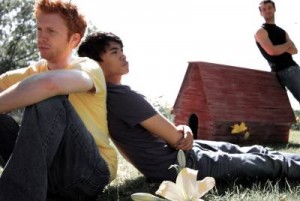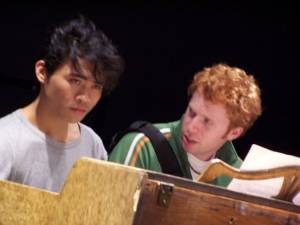RECOMMENDED
Bert V. Royal’s Dog Sees God: Confessions of a Teenage Blockhead imagines the lives of a group of high schoolers suspiciously similar to teenage versions of Charlie Brown and the rest of the Peanuts gang. Though legal considerations require a “has not been authorized or approved in any manner by the Charles M. Schultz Estate” disclaimer, fans of the comic strip will recognize CB (whose pet beagle has just been put down for rabies, though not before tearing to shreds “a little yellow bird who used to hang around”), Beethoven (a sensitive i.e. gay piano prodigy), Tricia (née Patricia formerly Patty, of the Peppermint variety) and her best friend Marcy (who used to spell her name with an –ie), Matt (a once dirt-cloud-plagued kid turned tough guy germo-homophobe), and Van (a stoner currently mourning the death-by-fire of his beloved blanket). CB’s sister and Van’s (neither of whom are referred to by name) complete the gang.
The late Mr. Schultz probably never imagined Charlie and his friends growing up quite like this, but then again who in 1950 (the year Peanuts made its debut) could have imagined the world in which Dog Sees God’s teenage protagonists live their very contemporary lives?
Following an award-winning L.A. premiere last year, Dog Sees God is back, in a mostly quite good production transferred from L.A. Valley College to North Hollywood’s Secret Rose Theatre. Though there is still room for improvement in performances and pacing, the Jon Cortez-directed staging entertains, moves, and provokes thought, thanks to an octet of talented young actors and Royal’s perceptive script.
Though CB is still living pretty much the same mundane day-to-day existence (and mooning over a cute red-headed classmate), the lives of his friends have changed in unexpected ways. His sister (not called Sally here) changes religions as often as she changes clothes, and though last week she was telling their mother that Mom would go to hell for reading Harry Potter, this week she’s a Wiccan and practicing white magic. Linus (oops, sorry, that should be Van) has turned pothead, and offers CB a “bud” as he waits for a delivery from “the Doober.” Matt (no longer “Pigpen”) now fancies himself ghetto, greeting CB with “My nigga, what’s up man?”, and is never without the bottle of antibacterial gel he keeps in a holster hanging from his belt. Van’s sister is still putting up that sign stating “The Doctor is IN” and doling out advice at 5¢ a pop, though now she does it from a mental facility where she’s been institutionalized following an incident in which she set the Little Red-Haired Girl’s hair on fire. Tricia and Marcy spend most of their time trash-talking “fucking-fatty-fat-fucking-fatass-Frieda” (and her naturally curly hair) and not so surreptitiously spiking their cafeteria drinks with vodka.
These two “mean girls” are not the only ones putting down classmates. Matt is so vicious that the mere sight of Schroeder (oops again, that’s Beethoven if you please) sets him off on a rant. “You see the way that fucking faggot looked at me!” he asks CB. “I fucking hate that faggot!” When CB tries to make amends to Beethoven for Matt’s name-calling, Beethoven will have none of it. “You haven’t spoken to me in years except to call me a faggot,” he retorts bitterly. Former close friend CB has, it seems, harassed Beethoven for years and once even dislocated his shoulder. “Don’t say you were just messing with me,” insists Beethoven, who has been afraid to eat in the school cafeteria since then. “No wonder kids bring guns to school and shoot you fuckers down.”
Still, CB (who is after all still Charlie Brown at heart) invites Beethoven to a beer bash that night and won’t take no for an answer. At the kegger, when Matt starts to get in Beethoven’s face about being where he’s not wanted, CB shows everyone there that Beethoven is wanted by at least one of the party guests. He plants a big wet kiss on Beethoven’s lips!
From this point on, Dog Sees God becomes much more than just a funny and often raunchy comic gem. It is that, indeed, but in Royal’s perceptive script, it is also a touching love story, a look at the causes of homophobia, and a plea for acceptance.
As CB, Timothy Miller is almost too red-headed charismatic to be the Sad Sack Charlie we know so well, but his is a performance that starts strong and grows stronger as the play progresses. Heart-on-his-sleeve sincere and utterly endearing, Miller is absolutely convincing as a teen alternately confused and elated by the unexpected discovery of feelings for the last person he’d expect to fall for. By the time the play’s final ten minutes roll around, the overwhelming pain and regret CB feels about what he did and what he didn’t do are so real that they are not easily shaken at curtain calls. This is powerful, deeply moving work.
Carlo Maghirang is a sweetly touching (and believable) Beethoven, and he does his own piano playing! Another standout is Alyssa Carter, hilarious as CB’s outlandish sister. (When Carter performs sis’s one-girl show, Cocooning Into Platypus, about a caterpillar who longs to metamorphose into a platypus instead of a butterfly, an off-off-off Broadway star is born.) Emily Lehrer is funny and quirky as Van’s institutionalized sister.
The rest of Cortez’s cast all have their good moments. Paul Dietz reveals a Matt whose homophobia may come from his own repressed feelings for CB. Matthew J. Middleton gets laughs every time he tries to speak with his lungs full of pot. The more over-the-top they are, the more amusing Crystal Castillo and Katherine Ko are as Tricia and Marcy.
I’d like to have seen more venom from Maghirang in his final scene with Dietz, particularly when Beethoven spits out the one word Matt hopes never again to hear. Dietz’s Matt could be even more villainous, conflicted, and full of himself. A study of Sean Penn’s Spicoli in Fast Times At Ridgemont High could suggest ways for Middleton to make Van an even funnier stoner. Finally, Castillo and Ko could easily double the laughs they get by working on comic timing and getting more oomph out of punch lines. For the production as a whole, a quicker pace and faster picking up on cues could trim running time and up the laughter quotient considerably.
The uncredited set design has a nice comic book feel about it and Cullen Pinney’s lighting design is an effective one. Amanda Yollin’s costumes fit each character to a T, and Sean Schwartz’s sound design features a good choice of music, particularly a poignant use of Mika’s “Happy Ending.”
Ultimately, in the immortal words of The Who, these kids are alright, and they and their director all deserve major props for their work, their dedication to the project, and their initiative in bringing their LAVC production to a larger audience. I can’t imagine anyone with a heart not ending up moved by this production.
The Secret Rose Theatre, 11246 Magnolia Blvd., North Hollywood.
http://dogseesgod.wordpress.com
–Steven Stanley
July 26, 2009




 Since 2007, Steven Stanley's StageSceneLA.com has spotlighted the best in Southern California theater via reviews, interviews, and its annual StageSceneLA Scenies.
Since 2007, Steven Stanley's StageSceneLA.com has spotlighted the best in Southern California theater via reviews, interviews, and its annual StageSceneLA Scenies.







 COPYRIGHT 2024 STEVEN STANLEY :: DESIGN BY
COPYRIGHT 2024 STEVEN STANLEY :: DESIGN BY